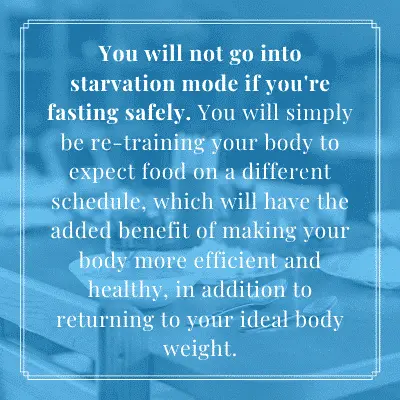In this article, we will be discussing the difference between fasting vs eating less, or calorie restriction. We’ll talk about some of the potential dangers and disadvantages to eating less in comparison to fasting, as well as suggest a few ways you can keep weight gain to a minimum while maximizing your health.
The Science of Weight Loss
You may be wondering why you would ever fast, completely denying yourself food if you could simply eat less.
When you eat less your body goes through some significant physical and even psychological changes. When you reduce your calorie intake below what you need to thrive, you’ll notice physical systems such as becoming cold, even if it’s warm out, for example. The human body needs a certain amount of calories to burn throughout the day to maintain comfortable and normal body temperature, not to mention the strength and physical endurance to perform all of your normal daily tasks.
When you eat less your body does not get the calories it needs. Sure, calorie restriction will help you lose weight in the short term. You’ll also lose more muscle mass and be more hungry, and the results will be less sustainable when you compare this method of weight loss to the success of fasting.
When you fast, you burn fat instead of muscle mass, and you gain more muscle mass. Fasting is a much more sustainable and healthy way to lose weight for the long-term.
The Only Way To Lose Weight Sustainably
The only way you can sustainably lose weight is by balancing your hormones, especially insulin, the hormone that controls fat storage. When you’re constantly eating, your body will continue to produce insulin to regulate how your energy is used – either for immediate energy or for future use. If you eat more than you need for immediate energy, insulin tells your body to store the rest as fat.
Dr. Jason Fung, the world-renowned expert on intermittent fasting, explains insulin with a brilliant comparison to a refrigerator. Glucose, or more specifically glycogen, he explains, is like storing food in a refrigerator: easy to put food in, and easy to take it back out. Fat, however, is more comparable to freezer storage: you can store plenty of food inside it, but it’s out of the way and not the easiest to reach, so you don’t use it as often.
This is where the calories in/calories out theory of weight loss starts to fall apart. Not all calories are the same. Going back to the fridge and freezer comparison, calories get stored in the fridge as glucose and fat in the freezer. Before you’ll ever use your fat, you have to burn through the sugar first. This is impossible if you’re constantly putting more sugar in your fridge.
One way to solve this problem is to follow a low-carb, high-fat, diet that is low in sugar. By restricting carbohydrates, the energy you burn will be coming out of your fat freezer.
An alternative option is intermittent fasting. Fasting burns through all your stored sugars quickly leaving your body with no choice but to burn the fat for energy.
Fasting vs Starving
There are a lot of myths surrounding fasting, one of which is “Starvation Mode”. Starvation mode is your body’s response to long-term calorie restriction. The chronic, unrelenting stress your body is under scares your biological processes into shutting down your metabolism, which effectively stops burning fat.
If you go for a significant period with very low calorie consumption, you’re likely to start experiencing starvation mode symptoms such as lethargy, low motivation, and fatigue, inability to moderate body temperature, depression, and even hair loss.
While at first calorie restriction may trigger initial weight loss, over time it will destroy your metabolism, making you much more likely to gain weight as your body begins to hoard calories.
Fasting in conjunction with a normal, well-balanced diet that meets caloric requirements is recommended by many modern nutritionists. Starving isn’t recommended by anybody and can do serious damage to your body.
You will not go into starvation mode if you’re fasting safely. Fasting is only short-term calorie restriction and shouldn’t ever last long enough to cause panic in your body. Especially with the regular practice of intermittent fasting, you will simply be re-training your body to expect food on a different schedule, which will have the added benefit of making your body more efficient and healthy, in addition to returning to your ideal body weight.
If you begin to see consistent symptoms of being in starvation mode, you’ll want to begin eating regularly again immediately. A fasting coach or nutritionist will be able to help you structure a healthy diet and fasting regime that will meet your goals without any dangerous side-effects.

Keep the Weight Off
If you’ve been struggling to find a diet that will help you lose weight and keep it off, you’ve probably realized that eating less is not going to work long-term. Fasting can.
If you’re looking for more ways fasting can make weight loss sustainable in your life, check out our post, Fasting To Lose Weight, to see and learn many more ways to incorporate this ancient tradition into your life.
Case Studies and Research



